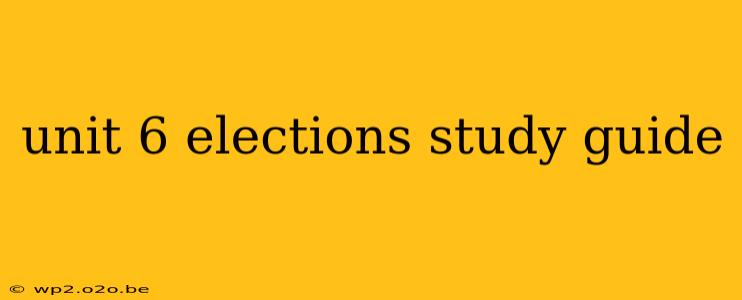This study guide provides a thorough overview of Unit 6's election-related topics, covering key concepts, processes, and significant historical events to help you ace your exam. We'll explore the intricacies of the American electoral system, focusing on its evolution, challenges, and ongoing debates.
Understanding the Electoral Process: From Primaries to the Presidency
This section delves into the multifaceted stages of the American election process, from the initial primaries and caucuses to the final presidential inauguration.
Primaries and Caucuses: The Path to Nomination
- Primaries: Direct elections where voters choose their preferred candidates within a political party. We'll examine different types of primaries (open, closed, etc.) and their impact on candidate selection. Understanding the strategic considerations candidates face in navigating the primary season is crucial.
- Caucuses: Meetings where party members gather to discuss and select candidates. We'll compare and contrast caucuses with primaries, highlighting their strengths and weaknesses. The role of party organization and grassroots activism in caucuses will be examined.
- Superdelegates: (In the Democratic Party) unelected delegates who can vote for any candidate, adding a layer of complexity to the nomination process. Their influence and the arguments for and against their inclusion will be discussed.
The General Election: Campaign Strategies and Voter Turnout
- Campaign Finance: Explore the role of money in elections, including campaign donations, PACs (Political Action Committees), Super PACs, and the ongoing debate about campaign finance reform. We'll analyze the influence of large donors and the potential for corruption.
- Media's Role: Understand the impact of television, social media, and other forms of media on shaping public opinion and influencing voter choices. The concepts of media bias and the spread of misinformation will be addressed.
- Voter Turnout: Analyze factors that affect voter turnout, such as demographics, registration laws, and the overall political climate. We'll explore strategies to increase voter participation and the consequences of low voter turnout.
- Electoral College: A deep dive into the intricacies of the Electoral College system, including its historical context, its impact on presidential elections, and the ongoing debate surrounding its reform or abolishment. We will analyze how the Electoral College can lead to a candidate winning the popular vote but losing the election.
Beyond the Presidency: State and Local Elections
While the presidential election often dominates the news cycle, it's important to understand that elections also occur at the state and local levels. This section will cover:
- State-Level Elections: Governors, state legislatures, and other state offices. We will examine how these elections influence policy and their importance in the broader political landscape.
- Local Elections: Mayors, city councils, school boards, etc. We’ll explore the significance of local elections and their impact on everyday life.
Challenges and Debates in the American Electoral System
This section analyzes some of the ongoing challenges and controversies surrounding the American electoral system:
- Voter ID Laws: The debate surrounding voter ID laws and their potential impact on voter access, particularly for marginalized communities.
- Gerrymandering: The manipulation of electoral district boundaries for partisan advantage and its consequences for fair representation.
- Campaign Finance Reform: The ongoing debate about regulating campaign spending and preventing undue influence by wealthy donors.
- Electoral College Reform: Arguments for and against abolishing or reforming the Electoral College.
Historical Context: Key Elections and their Significance
This section will explore pivotal elections throughout American history, highlighting their impact on the political landscape and the evolution of the electoral system. Specific elections covered will depend on the curriculum of your Unit 6.
This comprehensive study guide provides a strong foundation for your Unit 6 elections exam. Remember to supplement this information with your course materials and further research to ensure a thorough understanding of the subject matter. Good luck!

